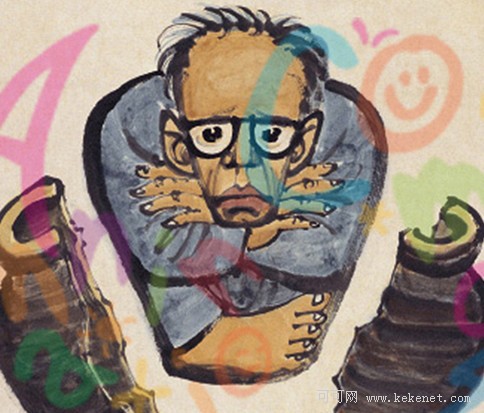
In these gloomy, uncertain times, the ability to have a good laugh — especially at your own expense — may be essential for survival. But are people really capable of having a sense of humor about themselves?
在低迷犹豫的时候,没有什么能比具有开怀大笑的能力更能帮助人恢复元气的了,特别是敢于自嘲的魄力。但人们真的能够对于自己也充满幽默么?
In the first-ever study of its kind, Ursula Beermann of the University of California, Berkeley, and Willibald Ruch of the University of Zurich studied 70 psychology students to gauge their ability to laugh at themselves. The findings support what has long been believed: that being able to laugh at oneself is not only a distinct trait, but is also linked with having an upbeat personality and good mood and may be the foundation for a good sense of humor.
在目前破天荒的首次相关研究中,美国加州大学的Ursula Beermann与苏黎世大学的Willibald Ruch研究了70为心理学学生的子超能力。结果证实了长期以来的一种看法:能有自嘲的人不仅具有鲜明的个性品质,同时还有更加积极向上的心态,这都是使得他们具有良好幽默感的基础条件。
Participants in the study were asked to rate their ability to see the humor in their own plight. They also designated one or two friends to rate them on the same characteristic.
参加这项测试的学生被要求对自己的逆境中所表现出来的幽默感进行评分,他们还指定了一到两个朋友,并对他们在相同方面的个性进行评分。
While the students were filling out these questionnaires on a computer, its camera surreptitiously photographed their faces. The pictures were then altered using Mac Photo Booth software to make them look like distorted, funhouse-mirror images.
尽管学生们是通过电脑回答调查问卷的,但电脑的摄像头同时记录下了他们的遍布表情。图像会经过软件的加工,呈现出类似于游乐场哈哈镜的效果。
Afterward, the study participants were asked to rate distorted photos of people they didn't know. Their own stretched-out images were randomly inserted into the sequence — and that's where the experiment really started. Participants were videotaped as they viewed the images to see whether they laughed or smiled at themselves. The videos were analyzed, using a well-studied rating system of emotional expression, to see how genuine the participants' expressions of humor were.
随后,受测者们还被要求对于这些素不相识的人们的“哈哈镜”照进行打分。他们自己的扭曲的图像会被打乱之后随即的插入,而这时实验才真正的开始。摄像头记录下了他们在看到自己的图像时会否开怀大笑或未向。然后,这段录像会被通过一种专门研究情感表情的系统进行评级,以便研究受测者表情上所体现出的幽默感。
Eighty percent of participants genuinely smiled or laughed at least once when seeing their own silly image. However, those who claimed to have the ability to laugh at themselves — and whose friends' assessments matched their own — genuinely laughed and smiled more often and more intensely than the others.
有百分之八的受测者在看到自己滑稽的图像时至少一次的微笑与大小。而这些被认为是有“敢笑”的魄力的人对于自己的评估,与他的朋友们的评价结果是基本吻合的,这种发自内心的笑会比其他人更加频繁,更加的强烈。












